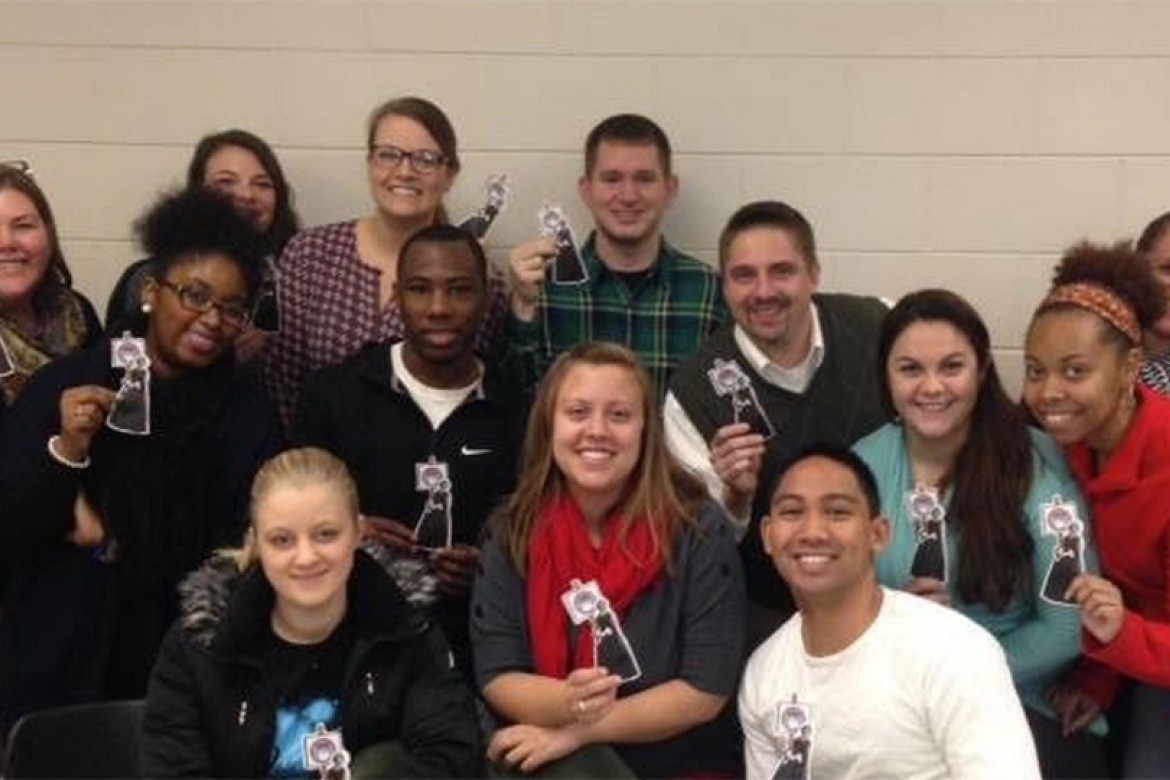Pursuing a career in college administration

There’s so much you can do with a liberal arts degree, yet there’s so much to do with a liberal arts degree.
Additional Degrees: Master of Education, Phd In Higher Education and Student Affairs
Employer: Department of Counseling, Adult and Higher Education, Northern Illinois University
"The liberal arts educational experience I received at MHC, specifically as a history and religion double-major, served me well both professionally (as a student affairs administrator and faculty member) and academically (during my masters and doctoral program). The picture [above] ... was taken during my course on campus environments and student subcultures as part of the #Maryatwork campaign during "FebruMary". The students were all holding cutouts of Mary Lyon holding a Class of 1998 sign. That night we discussed the role of rituals, ceremonies, and institutional sagas as it related to college and universities cultures and subcultures. I, of course, provided examples from Mount Holyoke."
In addition to her current career at the Northern Illinois University, Kortegast has also served as an Assistant Professor of the Practice for Higher Education in the Department of Leadership, Policy and Organizations at Vanderbilt University. She has taught courses on topics, such as, campus environments, college and university governance and management, college student development theory, and diversity in higher education. From the practice of higher education in administration to LGBTQ issues in colleges and universities, Kortegast studies and teaches about important considerations for education and educational systems.
As an undergraduate, Carrie was active in many co-curricular activities: she was in student government, a class officer, and on the rugby team. After talking about her activities as a student with an advisor in the Career Development Center, she realized that she would “enjoy a college environment, and that maybe [she] would enjoy student affairs administration.”
After graduation, she began this exploration with a job in the MHC Admissions Office. Afterward, she worked for one-and-a-half years for the Alumnae Association in a division for special events and clubs. From this work, she realized that while she liked working within higher education, she was interested in shaping students’ current experiences.
As a result, she attended graduate school at the University of Massachusetts-Amherst for a master's degree in higher education administration. As part of her program, she had an assistantship in the Department of Residential Life, which provided great professional experience that helped her connect her studies and work.
After graduating from UMass, she took a position at Denison University as Assistant Director of Residence Life, which led to a promotion as Assistant Dean of Students and Director of Housing and Residential Life. Afterward, she started a PhD program at Iowa State University in higher education and student affairs, to continue advancing her career in higher education and administration.
Beginning a career in college administration and Higher Education
Before obtaining a Master’s degree, Kortegast recommends students to try to gain some professional experience working in a college or university setting. Students who begin a graduate program with more professional experience come prepared with “sophisticated thinking on higher education as an organization”. However, she does note that it can be hard to find an entry-level position in those departments and offices without a Master’s degree.
Getting involved in any type of work related to higher education issues, or work on a campus, can help students decide whether or not this field is for them. She has also found that “very few people think of [work in] student affairs,” in the sense that people more likely “fall into” it rather than plan a career in college administration. It’s also a very interdisciplinary field, though many History majors have found themselves in this type of work. It makes sense for history majors to think about entering this field of student affairs and higher education administration.
She also notes that graduates in her field enter state, local, and federal government work besides college and university administration, as well as policy work with nonprofits and organizations.
Advice to graduates
Kortegast believes that the greatest struggle for students graduating from Mount Holyoke can be the wealth of opportunities. “There’s so much you can do with a liberal arts degree, yet there’s so much to do with a liberal arts degree.” Kortegast wants to remind students that
“careers take time. I struggled a lot with [this idea of] letting Mary Lyon down, I thought a lot about it.”
Early in her career she thought about how she “was not doing it fast enough,” and noted that it’s important to take a step back from that mindset. In addition, “we [MHC alums] engage in performative acts that play out in the Alumnae Quarterly,” but we need to reevaluate what success looks like. She says how the competitive environment that Mount Holyoke has can be stressful for recent graduates taking their time to find their footing, but the process is important and does not call for a particular timeline. Overall, students should take their time to explore new fields and interests.